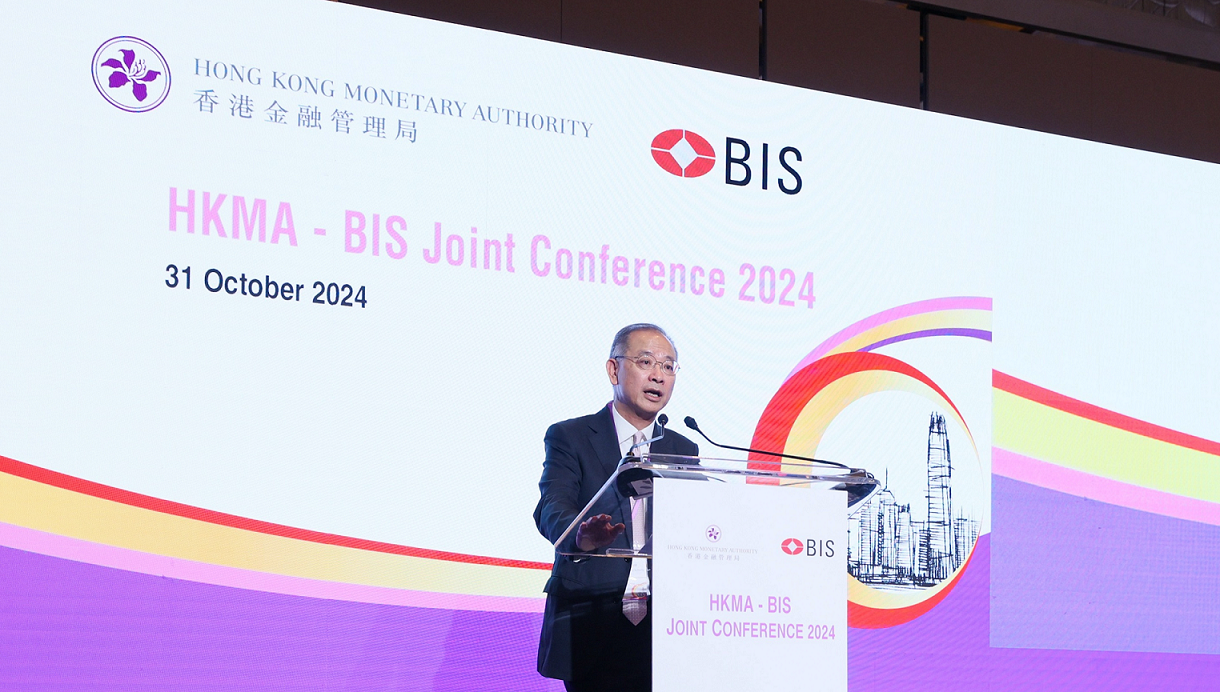
As disruptive technologies — most notably artificial intelligence — stand as a game-changer and their adoption is a given, what remains challenging is getting adoption right with the right guardrails in place, central banks and financial regulators heard at the HKMA-BIS Joint Conference in Hong Kong on Thursday.
“Despite many unknowns surrounding the actual application of generative AI in financial services, one thing is clear — AI has no boundaries; it is advancing at an unprecedented speed; and its impact is revolutionary,” Eddie Yue Wai-man, chief executive of the Hong Kong Monetary Authority (HKMA), told the conference, which was jointly organized by the HKMA and the Bank for International Settlements in Hong Kong.
“No single party — be it a public or private entity — can deal with all the challenges alone,” Yue said, calling for public-private partnerships and international collaboration to leverage the collective wisdom of all stakeholders.
READ MORE: City sets sights on responsible AI use in finance
The conference was first held in March 2023, when the banking sector turmoil that took down several US lenders and what was once Switzerland’s second-largest bank by assets sent jitters through the global financial system.
The crisis stands as a wake-up call about how technology meant to provide convenience to customers could also pose challenges to banks. More than 18 months after the daunting episode, “the role of technology has only become more important. Technological advancements are reshaping our world at an astonishing pace,” Yue said.
The McKinsey Global Institute estimated in its March report that across the global banking sector, GenAI could add between $200 billion and $340 billion in value annually, or 2.8 to 4.7 percent of total industry revenues, largely through increased productivity.
But the sheer power of technology is a double-edged sword and regulators are taking a sober, hard look at it.
“AI models come with a unique and powerful combination of features. They learn and evolve autonomously and at speed based on a broad range of data, with outputs that aren’t always interpretable or explainable, and objectives that may be neither completely clear nor aligned with society’s goals. Even experts don’t agree on how far and how fast AI’s use, including in finance, will evolve,” Sarah Breeden, deputy governor of the Bank of England, said in a video keynote speech.
Yue employed a metaphor to describe why it is challenging but crucial to balance innovation with regulation.
“Let’s imagine the banking system is a bustling city. Emerging technologies are like highways that allow cars to travel faster, and more efficiently, towards their destinations. To keep these cars safe, we need guardrails along the edge of the highways to prevent the cars from going off course,” Yue said, adding that guardrails in the financial world represent appropriate regulatory frameworks and risk management practices of banks in response to evolving risks associated with new technologies.
While not jumping to knee-jerk policy responses, Breeden urged central banks and financial regulators, with a humble and well-prepared attitude, to keep under review whether their micro and macro-prudential policies remain sufficient to maintain financial stability.
“This is how we can harness AI’s considerable benefits for economic growth in a safe and sustainable way,” she said.
The successful adoption of cutting-edge AI not only depends on the technology, but also on the workforce who make smart use of it, said Tan Yeow Seng, chief cyber security officer at the Monetary Authority of Singapore.
READ MORE: Hui: HK to lay out new AI policy at FinTech Week
Citing Amara’s Law — “We tend to overestimate the effect of a technology in the short run and underestimate the effect in the long run,” James Elwes, chief information officer of Asia Pacific at HSBC, underscored the importance of having the targeted talent and recruitment strategy in place to pave the way for bigger AI story.
Yue said HKMA will update its skill-mapping exercise to identify potential skill shortages in the banking sector over the next five years, from 2026 to 2030, and publish the findings next year.
The city’s de facto central bank also pointed to a new GenAI sandbox recently launched in collaboration with Cyberport, as a living embodiment of the “step-by-step nature” of an iterative approach adopted by the HKMA in promoting the application of GenAI in the banking industry. The sandbox, which allows banks to test out new ideas within a risk-managed framework, is currently open for applications.
Contact the writer at sophialuo@chinadailyhk.com


